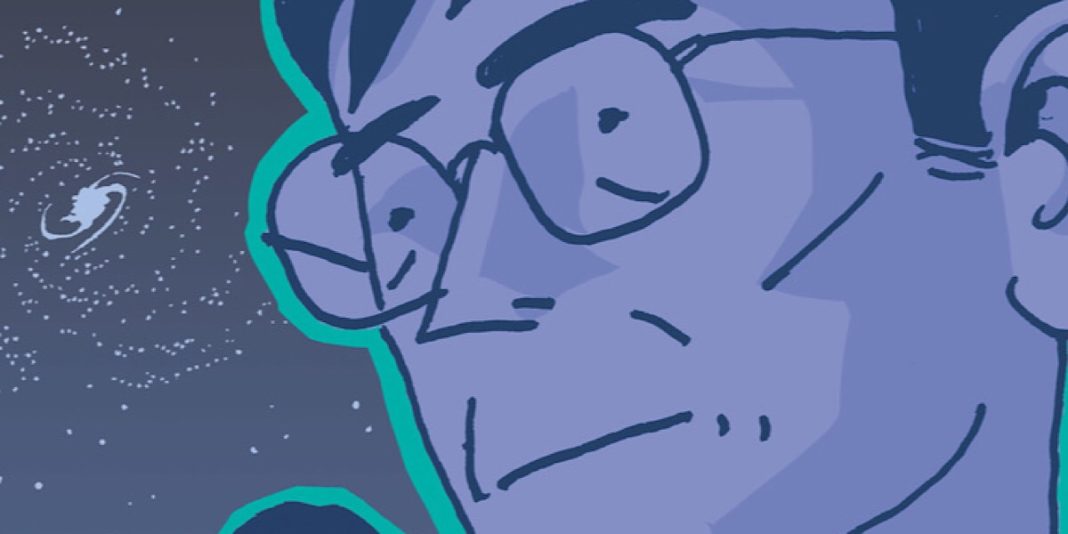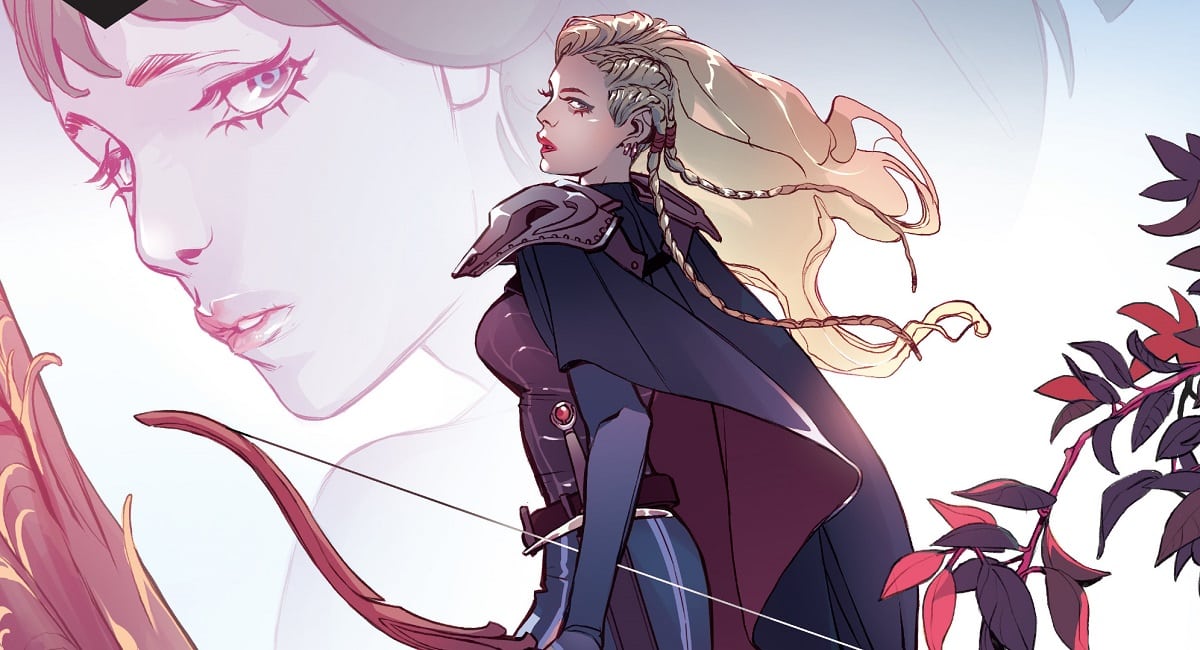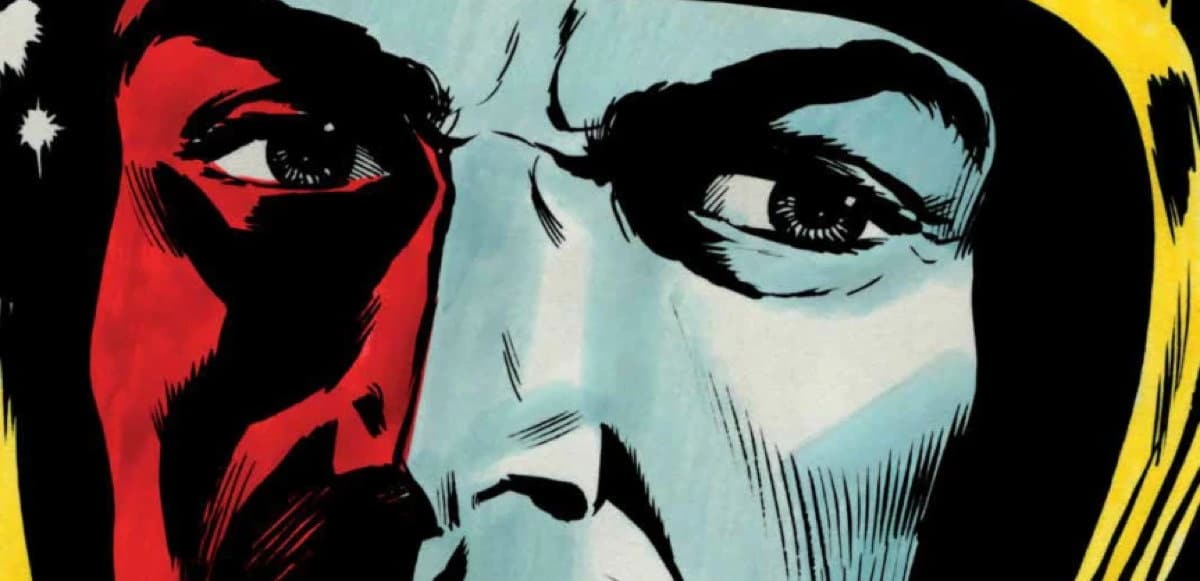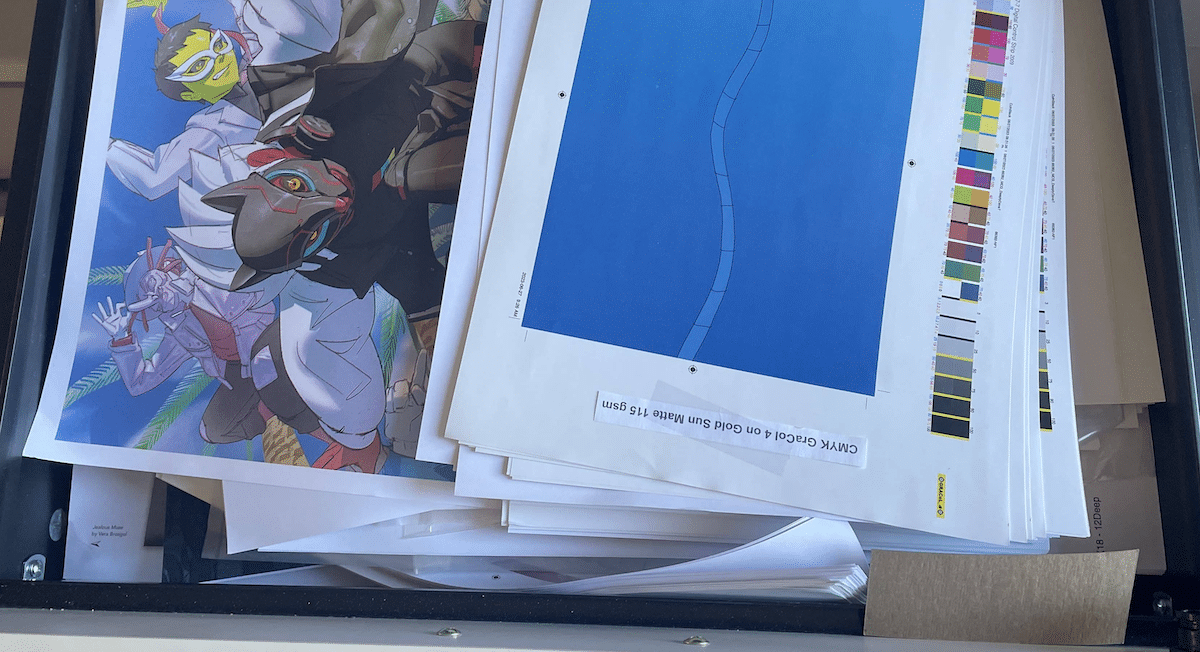Nuclear engineer-turned-librarian Jim Ottaviani and artist Leland Myrick have a knack for turning theory—and the scientists who proposed them—into something accessible and enjoyable on the comics page. Feynman, the duo’s first collaboration, was fun and entertaining. Their newest collaboration is Hawking, a biography of the late theoretical physicist who expanded black hole cosmology and became a popular for his best-selling A Brief History of Time.
Ottaviani, who paneled and signed for attendees at Comic-Con 50, joined The Beat for a chat about his latest project.
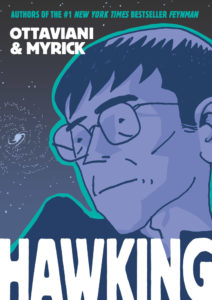
Jim Ottaviani: Oh gosh, it’s more of a surprise, I guess, that I didn’t think of it on my own than anything else. But I really hadn’t given it much thought until a fellow tutor suggested that I should go meet him, maybe even go to his birthday party. And I thought that sounds really cool, but also kind of wanted an invitation. I didn’t do it. But the longer I thought about it, it’s like of course there should be a graphic novel about Hawking, but kind of wanted him to be interested in it as well.
It turns out that in the meantime this friend had actually given a copy our Feynman graphic novel that I’d done with Leland Myrick, who is also the artist for Hawking, to Stephen Hawking. He liked the book. And so we got a message from her in early July of 2012 saying, first, ‘Well, it’s a pretty big day for us!’ because her husband had just won a bet back from Hawking. Second, there’s this Higgs boson thing, and it’s real. And third, ‘Oh, by the way Stephen likes the Feynman book and would like to invite you out to Cambridge to talk about doing a book about him,’ which was awesome. So that’s when we really started planning and really started doing the work on the.
Powell: How familiar were you with Professor Hawking’s research on black holes?
Ottaviani: I would say probably a little more than average, but not a lot. Just like anybody who follows science news or even just regular world news I knew what he was famous for. I knew about his struggles with his disease. But I was by no means an expert in black hole physics, and I still am not, of course.
Part not being an expert, I think, helps because I had to learn as I wrote the book. That experience of learning about this stuff was still fresh.
Maybe, hopefully that translated to how I was able to present the material and could give a better sort of beginner’s look at this stuff because I myself was, to a large extent, a beginner as well. So part of doing any science comic, especially a memoir comic, is to incorporate all that scientific research.
Powell: How difficult is it to make that science understandable to the layperson, or to make it understandable for the artist?
Ottaviani: I had to learn it, and if I can learn it well enough to describe it to Leland, who’s gonna have to draw it, then you’ve got a decent chance of communicating it to other people. In terms of the depiction. I think Leland’s art is particularly well suited for this type of work. He’s diagrammatic. Maybe that’s not a good way to think of it. He’s sort of got that clear line style that we associate with Franco-Belgian comics. And this was something that I was talking about with another person because he’s sort of got that diagrammatic, clear, maybe even occasionally sketchy, but never overly detailed, look at things.
The transition from narrative to diagrams is fairly smooth for the reader. It’s not like all of a sudden you’re doing a hyper realistic rendering of Nancy, and then you have to switch over to this graph, or this very cartoony thing that looks so different. Leland’s style fuses the two effectively so you can just move from a storytelling panel about his life to something that’s very physicsy without anything jarring visually happening.
Powell: And that leads me to my next question. So for somebody like Leland, who’s an artist and not necessarily a science background…
Ottaviani: Well, he has a degree in psychology, so he’s got some science chops in it, for sure, but not the physical sciences.
Powell: How difficult is it for him to grasp those concepts?
Ottaviani: That’s obviously a better question for him to answer than for me, so give him a shout. I’m sure he’d be happy to talk about it, how he pulls his hair out some nights trying to figure out what I mean.
Not everything that I do, not everything I give to an artist is purely words. There is lots of visual references. Sometimes I’ll sketch something out the way I think it could go to help things along here. He’s a professional. He’s trained to think in images. And he doesn’t need a lot of help from me, frankly. He’s also a smart guy. I view him as maybe like third pass editor. There’s me for a sample draft, second draft, over many drafts. Then there’s the editor; in this case it was Casey Gonzalez. And then we go back and forth trying to make it clear. I have to make sure Casey can understand things just based on the script. She hasn’t seen any art yet. And when we think we’ve got it right, hand it off to Leland. He’s going to be yet another set of eyes, and he’s the last and most important because very little of what I do ends up on the page. I write a 500-word description of the panel, but only ten words of those would be dialogue or captions or something like that. Everything else is in service of Leland creating an effective image to communicate that moment or that idea. And like I said, he’s a pro. He knows what he’s doing. So we’ll talk through things that are confusing. But most of the time he gets it. Oftentimes they’ll do something not entirely like what I suggested, but it’s better and that’s good.
Powell: Going to the end of the book, you leave open-ended the concept of some spirituality that Hawking achieves.
Ottaviani: I think that’s an interesting insight.
Powell: I don’t know if you intended this, but I think it’s interesting now in the aftermath. Didn’t he reject religion in the name of science?
Ottaviani: Right. So first of all that wasn’t intentional, but it’s a very interesting reading. And I like it. Now to your actual question, I sketched out the basic structure of that ending. Not long after leaving Cambridge…I was, in fact, still in England at the time. I was actually at Darwin’s house walking on Darwin’s sandlot when all of a sudden I think I know how to end this thing and stood there in the rain. It’s England in springtime. It’s got to be raining. Scribbling in a notebook, how he’s going to do this? It changed over the course of the years. And Leland brought his own thoughts and ideas, both visually and structurally, to that ending. Then we’re just about finished with the book, and as you said, Hawking dies. And that made us look at that again, re-evaluate it. And we had another reader come in, hired by First Second, to look at things, especially as they related to disabilities and our depiction of disabilities. And that made us rethink the way we were doing the ending as well. So we worked that thing over quite a lot. And somewhere along the way we got something in there that reached you with this idea of spirituality that wasn’t intentional, I don’t think, on either Leland’s or my part. But I think it’s valid.
I don’t think Hawking ever came to a belief in God. And I don’t think he would have considered himself spiritual in any of the usual ways we think about it. But as you saw in the book there is this tug of war between him and his wife who is, in fact, deeply spiritual and deeply religious. And it doesn’t help the relationship, but towards the end of his life I think they come to this thing where they agree to disagree and accept each other’s own worldview. And so it’s inevitable that some of her worldview crept into his thinking. And just like I was saying, it didn’t consciously creep into what we wrote and how we revised this. What is really interesting is that it probably did without our knowing. That’s the great thing about books. People read stuff. It’s like really it’s in there, I guess. Didn’t mean it.
Powell: It works. I think it was a good thing after such illness in his life.
Ottaviani: In a little bit of a way, I know what you’re saying here. For people who haven’t read the book, we’ll leave it at that and let people read it and think about it themselves. That would be, I think, any author’s hope, any creator’s hope, is that the book leaves you simultaneously feeling like you’ve got a good story beginning, middle and end. But also with some things to think about.
Powell: So there’s a scene in the book of Hawking experiencing zero gravity and the pure joy on his face. Did he actually tell that story to you?
Ottaviani: No, not to me, but he did tell that story, and it was extremely difficult. So here’s the interesting thing about ALS and about human physiology in general. Smiles do not require active muscle control. So when people feel joyful, and you know, there are limitations on that so I don’t want to sound like I’m a neurophysiologist or any kind of physician. But you and I, and I think most people, when we’re happy and feeling joyful a smile happens. You can consciously control it and force a smile, but a forced smile is a different thing. And that smile that comes into the eyes and expresses real joy, which I think Leland depicted beautifully, is there. You can see footage of him in zero G. You can find it on the web because, surprisingly, the company who did that flight, ‘Here is the thing that could happen to you!’ And then you see Stephen Hawking spinning around. ‘Yeah, dude I want to meet that challenge! Good enough for Hawking…good enough for me!’
So yeah it’s real. Even though he had lost control of virtually every muscle in his body, he would still smile with pleasure. And you see that in that zero G scene.
Powell: There were a lot of concepts you had to tone down in bringing Hawking to the comics page. So what things got dropped that you wish could have made it into the book?
Ottaviani: Oh gosh, you know I should be better prepared for this question! Because there is the cutting room floor scene, this movie terminology. And I know there are a bunch and we talked about doing some extras. But that means a lot of extra work for Leland, so we didn’t actually create any web extras or things like that. The stack of note cards that I have is this tall. And there are more words on the note cards than there are in the book. I wouldn’t have typed those things up if I didn’t think they were good story points to use. But in the end nobody’s going to publish a thousand page book. And Leland would literally kill me if I tried to do that. So you do have to cut stuff out of it. It’s a concern. But I gotta leave it aside. I mean the good news is this doesn’t have to be the last graphic novel anybody ever does about Stephen Hawking. There’s more that could be done. So get on it, people!
Powell: You mentioned that you were a nuclear engineer. And you transitioned into a librarian?
Ottaviani: That’s right.
Powell: So what is that like?
Ottaviani: Whiplash. It’s like whiplash.
Powell: And now you’re writing books that use your science degree.
Ottaviani: Yeah, yeah. I mean the skills that I’ve learned as a librarian and that I practice as a librarian are certainly helpful in terms of the research. And I work still; I’m no longer full time at the library. I’m doing a lot more writing and I like that. And it’s fulfilling in different ways than librarianship has been. But access to a big research library and all the tools and resources that are there has been tremendously valuable to me.
So it’s not actually that big a stretch. Writing the comics uses all the skills that I’ve built over the years and applies them to storytelling. That’s the one thing that I don’t have formal education in creative writing or storytelling. But it turns out that comics is kind of an open field even if you don’t have a degree in making comics or creative writing or anything. All it took in the 90s was me thinking there are no comics about scientists and there really should be. Waiting a while and still not seeing them. And then deciding, okay, it’s gotta be me.
Powell: Do you ever see yourself doing anything non-science in comics?
Ottaviani: Yes, and I do those things for fun. I’ve written a novel, and it’s probably not very good. It does have scientists as characters in the novel. Writing is hard. I didn’t realize how wedded I was to the comics form of storytelling, and breaking things up in panels and page spread, incision and efficiency. But maybe. I don’t know if anybody wants that from me, so I’ll keep doing things on my own and, you know, writing essays and writing blog posts. There are a lot of outlets for other types of writing that you can do. But I don’t think the field of science comics is tapped out yet. There’s a lot more to do.
Hawking is in stores now.


